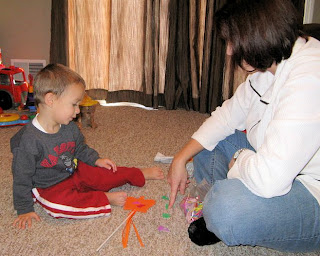There is an ongoing debate in the field of Early Intervention as to whether one hour a week of direct service is enough for children with or at risk for developmental delays. Although many factors must be considered when determining the frequency of services for a child, the single most important factor that will increase the likelihood of a child’s success is the extent to which family members follow-through with the strategies provided by the Early Intervention practitioners. It is a common misconception that Early Intervention is a home-based therapy service, and while I recognize that in practice it can sometimes be just that, it is not designed as such. Early Intervention is designed to be a family training program. It is designed to offer strategies, materials and resources that family members can use to help them achieve the goals they set for their child. It is much more than home-based therapy and done right can make a tremendous difference in the lives of each family member. The following article, reprinted from The OARACLE: The Organization for Autism Research’s Monthly E-Newsletter, discusses how parent training programs can lead to lasting changes in toddlers with Autism.
Can One Hour per Week of Therapy Lead to Lasting Changes in Young Children with Autism?
While all professionals recommend early intervention for children diagnosed with autism, there is often a delay between diagnosis and receiving interventions. This can cause added stress for parents while processing the diagnosis. Many parents feel helpless knowing they need to obtain services but not yet being able to. In this study, researchers investigated training parents one hour a week for 10 sessions to deliver services to their children, ages 0-2. Past studies have focused on interventions for children over the age of two. As diagnosis age decreases, more research-based interventions are needed for young infants. Other research on parent-directed interventions have shown an increase in verbal skills and appropriate behavior. This study focused on parent-directed interventions for younger infants. Parents were trained using a manual based on the Denver Model and Pivotal Response Training. This intervention was designed using research-based techniques to increase language skills and relationship development. Eight families were recruited to participate in this study. Children in the study were under 36 months old and diagnosed with autism. Parents participated for 12 weeks: two weeks of baseline and 10 weeks of training to implement the strategies. Parents were encouraged to use the strategies at home during usual daily activities. During the first two sessions, researchers gathered baseline data on targeted behaviors and asked parents to complete checklists and assessments. Targeted behaviors were “number of spontaneous functional verbal utterances” and “number of imitative behaviors.” During the following weeks, researchers videotaped play between the child and parent and child and therapist. These videos were used in data collection on target behaviors in 10-minute intervals. Parents were also assessed in competency of using the interventions. Researchers found that most parents implemented the strategies at or above criterion by the sixth session. During baseline, all child participants showed little to no imitative behaviors or spontaneous verbal utterances while playing with parents or therapist. After intervention, all children increased imitative behaviors and spontaneous verbal utterances. Children maintained high levels of targeted behaviors during follow up three months later. Researchers determined this increase in targeted behaviors was due to parent training rather than child interactions with therapists as behaviors increased as parents became more skilled at the strategies, therapists had high skill levels in implementing the strategies from the beginning of the intervention.
This study suggests that short-term parent training programs, as little as one hour a week for 10 weeks, does lead to changes in young children with autism. This is an important finding suggesting that parents can be trained in strategies immediately following diagnosis and begin.
Vismara, L.A., Colombi, C., and Rogers, S.J. (2009). “Can one hour per week of therapy lead to lasting changes in young children with autism?” Autism, 13, 93-115

No comments:
Post a Comment